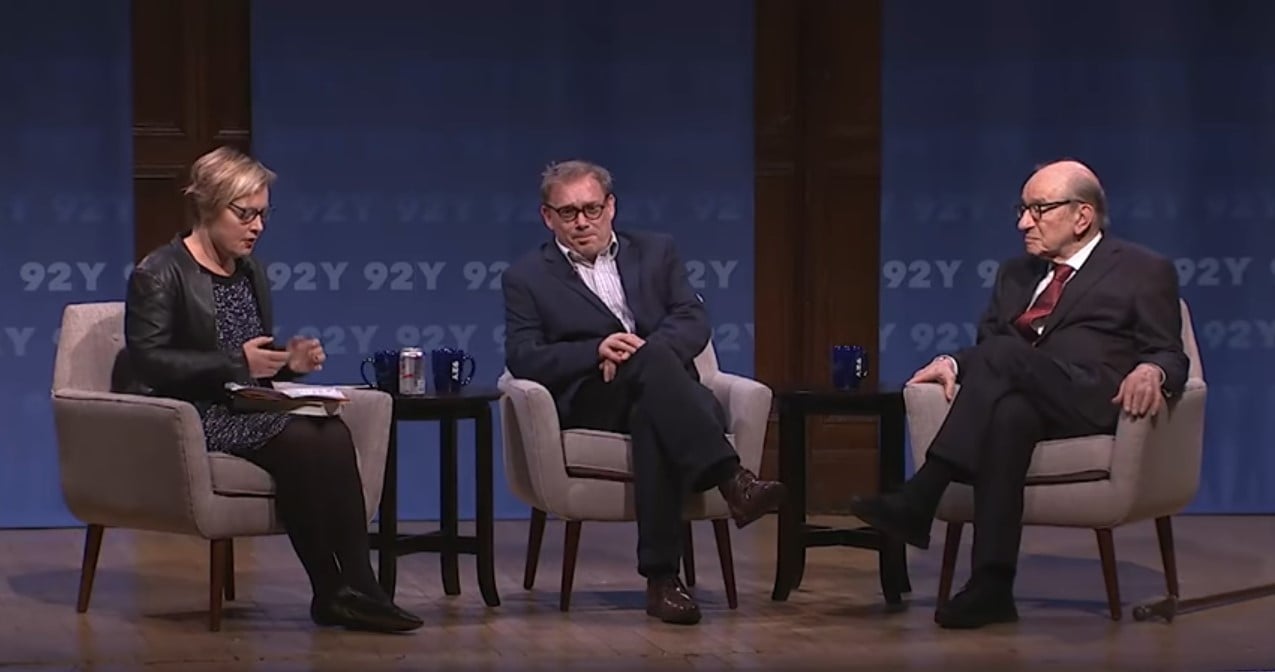Few people have a deeper understanding of the American economy than Alan Greenspan, legendary former chairman of the Fed.
And there’s no better moment to apply the lessons of history to the most pressing questions we face. Together with his co-author, noted Economist writer and historian Adrian Wooldridge, Greenspan joins Gillian Tett, US managing editor of the Financial Times, for a discussion about their landmark new book, Capitalism in America: A History.
Q1 hedge fund letters, conference, scoops etc
They’ll give a sweeping view of America’s evolution from a small patchwork of colonies to the most powerful engine of wealth and innovation the world has ever seen. They’ll tackle the riddle of innovation: where does it come from, and how does it spread throughout a society? They’ll ask why America is uniquely tolerant of the effects of creative destruction—the ceaseless churn of the of the old giving way to the new, driven by new people and new ideas. For now, productivity growth has stalled again, stirring up the populist furies. Will the United States will preserve its preeminence, or see its leadership pass to other, inevitably less democratic power?
Capitalism In America: Alan Greenspan And Adrian Wooldridge In Conversation With Gillian Tett
Transcript
Well it is yes. But the point at issue is that the history of the United States is extraordinary in the sense that. It's we started just on the edges of North America. With Plymouth and. Basically just going through around move a little bit down to Virginia. And we ended up with a very short period of time. The most important industrial power in the world. And that's an extraordinary story. It's not self evidently going to occur that way. And we even find that the entrepreneurship. Which exists. At the core of all business. Is still there in the United States in the sense that. Oh we've been through an awful lot and now we're back on top. With respect to.
The transistor go all of the electronic systems that come as a consequence of that and are really still the largest major economy in the world.
So what made you write this particular book at this moment.
Oh both. It's a phone call from my publisher.
That wins prizes on this.
But I mean well what is what he calls really he said we have a job for you. We'd like you to write an economic history of the US. And I said to him but wait a second. I'm not a historical historian. He says look we're your publisher we're your editor. You are a historian but. And besides I've asked Adrian Wooldridge of The Economist to join you. And I said that's terrific.
And we've had three years of remarkable. Oh no we don't even argue that which is the most extraordinary thing is that I had expected run to run into a problem. Whereas since my view is I know a very idiosyncratic in certain respects that I would never find somebody with whom I could find a coincidence of ideas. And. I don't think we've really argued we had one small argument very recently he won so he would tell you what it was or maybe a drink and tell us later. So you set out to write an economic history of the US.
In many ways this is a remarkable book because it not only sets out a very clear intellectual framework for how you've seen America develop and I'll come onto that in a minute. It also has the most unbelievable amount of astonishing statistics which frankly I didn't know about aspects of American development. I mean if anybody ever wants to play Trivial Pursuit with your family in this coming vacation season this is the perfect book to win with because every single statistic you can imagine which no one else knows about how America has developed is in here. Any particular fascinating statistic or numbers you discovered as you researched the history of America.
A lot of them where do you want to start. Well first what we did is.
We decide that what is going to be the central core of the book. And it turns out to be. Creative destruction which is what some paid in the concept. We'd never evolve all that into anything. But what. Creative destruction basically is.
Is creating the new from the old. And. Just as fascinating to evaluate the creative destruction part meant for example. Major forward advance and steel industry in the United States occurred as a consequence of the Bessemer furnace which is. A British. Bread who. Got Andrew Carnegie.
So excited about what it was he was producing that he rebuilt his whole.






